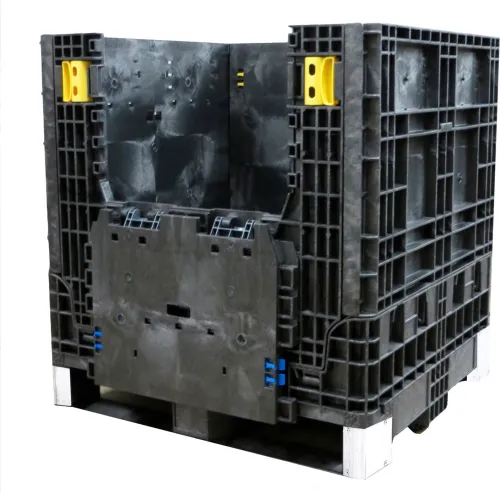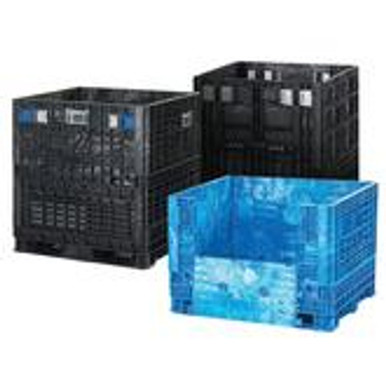Why Bulk Containers Are Essential for Economical and lasting Transportation
Mass containers play a vital function in contemporary logistics. They help with the reliable movement of huge quantities of products, therefore maximizing transport procedures. This approach not just reduces costs however also lessens ecological influence with reduced emissions and waste generation. As sectors look for more lasting techniques, the fostering of bulk containers is ending up being significantly considerable. What ramifications does this change hold for future logistics and supply chain monitoring?

The Advantages of Making Use Of Bulk Containers in Logistics
Bulk containers transform logistics by boosting effectiveness and sustainability. These containers permit the transportation of large amounts of items in a single journey, substantially decreasing the number of trips required. This not only streamlines procedures yet additionally lessens labor costs related to handling, loading, and unloading. In addition, bulk containers are developed to enhance room use within transportation vehicles, ensuring that even more items can be shipped concurrently.
The standardization of mass containers additionally simplifies the logistics process. With uniform dimensions, they can be easily piled and saved, bring about improved stockroom management. Bulk containers often feature sturdy products that safeguard contents from damages during transit, thereby lowering product loss and raising general reliability. Consequently, companies can experience improved supply chain efficiency, ultimately bring about raised earnings and customer complete satisfaction. This mix of aspects makes mass containers a critical possession in modern logistics.
Ecological Impact: Lowering Waste and Carbon Footprint
As sectors progressively prioritize sustainability, the fostering of bulk containers has actually emerged as a crucial strategy for lowering waste and lowering carbon impacts. These containers reduce the use of packaging products, such as boxes and plastic, thereby significantly lowering overall waste generation. By combining shipments, mass containers improve transportation efficiency, enabling more items to be transported per trip. This decrease in journeys straight correlates with lower greenhouse gas emissions, adding to a smaller sized carbon footprint.
Additionally, bulk containers can typically be recycled or reused, even more minimizing environmental effect. The longevity of these containers guarantees they can endure several transportation cycles, lowering the demand for single-use options. used collapsible bulk containers. By enhancing logistics and advertising reliable source usage, mass containers not just support lasting methods however additionally encourage sectors to align with worldwide environmental objectives. Ultimately, their application mirrors a dedication to ecological stewardship and liable resource management
Cost Financial Savings: How Bulk Containers Lower Transportation Expenses
While several companies seek ways to boost their profits, the usage of mass containers offers a substantial opportunity for reducing transportation costs. Bulk containers make the most of the volume of items transported, allowing businesses to deliver bigger amounts at the same time. This efficiency decreases the variety of journeys required, straight decreasing fuel expenses and lessening labor expenses connected with loading and discharging.
Furthermore, bulk containers typically feature streamlined designs that enhance space application within transport cars. This suggests less empty rooms, leading to a lot more efficient use readily available capability. The toughness of bulk containers can lower the risk of product damages during transportation, ensuring and lowering losses that more products show up undamaged.
Enhancing Supply Chain Performance With Mass Storage Space Solutions
Mass storage space services play an essential function in enhancing supply chain efficiency by optimizing stock monitoring. By combining products into less, larger containers, organizations can substantially decrease taking care of expenses connected with constant transfers and handling. This streamlined technique permits better tracking and management of inventory, eventually leading to improved functional performance.
Structured Inventory Management
Effective inventory administration is important for enhancing supply chain procedures, particularly when companies embrace bulk storage space remedies. These services make it possible for services to preserve greater stock degrees while reducing the regularity of replenishment. By combining products right into mass containers, business can enhance their inventory procedures, reducing the intricacy associated with tracking numerous smaller sized packages. This strategy facilitates accurate stock counts and boosts projecting precision, permitting more educated decision-making. In enhancement, mass storage options simplify storehouse company, making it much easier to find and accessibility items when required. Because of this, organizations can accomplish an extra effective supply turnover rate, ultimately improving total supply chain efficiency and decreasing the possibility of stockouts or overstock scenarios.

Reduced Handling Prices
The implementation of mass storage services not just streamlines inventory administration however additionally substantially decreases handling expenses throughout the supply chain. By settling products into mass containers, business decrease the requirement for regular handling and transfer in between different storage and transport systems. This technique reduces down on labor prices linked with loading, discharging, and moving smaller plans. Additionally, bulk storage lowers the frequency of shipments, bring about lower transport prices and reduced gas consumption. Consequently, organizations can optimize their logistics procedures, enabling a much more effective appropriation of resources. Eventually, minimized managing expenses add to boosted total supply chain performance, promoting a setting that sustains both sustainability and financial practicality.

Adaptability of Bulk Containers Throughout Numerous Industries
Several industries have unique demands for transport and storage, mass containers have emerged as a versatile option that fulfills a wide array of requirements. These containers, ranging from large containers to specialized storage tanks, can fit diverse products, consisting of powders, granules, and fluids. In the farming industry, bulk containers help with the transportation of plant foods and grains, while the food and drink industry uses them for components and finished products. The chemical industry counts on mass containers for securely moving unsafe materials, guaranteeing conformity with security policies. Furthermore, construction firms gain from mass containers for delivering accumulations and various other products. Their flexibility prolongs to different settings of transport, consisting of ships, vehicles, and trains, improving logistical efficiency. This convenience not only simplifies procedures across different markets yet also promotes sustainability by reducing product packaging waste and enhancing room en route. As a result, mass containers play an essential duty in modern-day supply chain management.
Future Fads in Bulk Container Usage and Sustainability
The future of bulk container usage is significantly formed by cutting-edge materials growth that boosts sustainability. In addition, automation in logistics promises to improve procedures, lowering waste and improving efficiency. Embracing circular economy techniques will even more change how bulk containers are created, used, and recycled, promoting a more sustainable transportation landscape.
Ingenious Products Growth
As industries significantly focus on sustainability, ingenious materials development in bulk containers becomes a significant consider boosting environment-friendly transportation solutions. Manufacturers and researchers are discovering naturally degradable plastics, recycled compounds, and light-weight steels to reduce ecological impact. These materials not just reduce waste however likewise boost fuel efficiency by reducing the overall weight of containers. In addition, developments in clever products, which can adapt to differing conditions, boost the resilience and performance of bulk containers. The integration of these innovative products straightens with circular economy principles, promoting reuse and recycling. As the need for lasting methods expands, the growth of such products will certainly play an important duty in forming the future of mass container usage in logistics and transportation.
Automation in Logistics
Substantial innovations in automation are positioned to transform logistics and the application of mass containers, enhancing sustainability in transportation. Automated systems, including drones and self-governing lorries, are enhancing the activity of bulk containers, decreasing the reliance on traditional fuel-powered transport. These modern technologies enhance directing and loading processes, improving and decreasing empty miles gas performance. Furthermore, automated supply management systems boost tracking and tracking of bulk containers, guaranteeing better resource allotment and used collapsible containers lowered waste. The integration of the Internet of Points (IoT) permits real-time data analysis, making it possible for proactive decision-making that aligns with sustainability objectives. As automation proceeds to evolve, it is expected to drive better technologies in mass container use, ultimately supporting even more lasting logistics techniques and reducing the ecological influence of transport.
Circular Economic Situation Practices
Innovations in automation are establishing the stage for an extra incorporated strategy to circular economic situation practices in the domain name of mass container use. As markets significantly embrace sustainability, mass containers are being made for longevity and reusability. This shift not only lessens waste however also enhances source performance. Business are taking on strategies such as closed-loop systems, where used containers are collected, reconditioned, and reestablished right into the supply chain. Additionally, smart modern technologies track container life process, helping with better management and reducing ecological influence. The cooperation between makers, logistics providers, and end-users is important in developing criteria for lasting container usage. used collapsible bulk containers. Future fads suggest an expanding focus on materials that are naturally degradable and recyclable, additional strengthening the circular economic climate's principles wholesale transport

Often Asked Concerns
What Materials Are Bulk Containers Generally Made From?
Mass containers are usually constructed from sturdy products such as high-density polyethylene, aluminum, cardboard, and steel. These materials offer toughness, convenience, and protection, making them ideal for carrying various items in different industries efficiently.
How Do I Select the Right Dimension Bulk Container?
Selecting the best size mass container entails reviewing the quantity of products to be delivered, considering taking care of tools compatibility, and evaluating storage area needs. Proper dimension guarantees efficiency in transportation and lessens waste during delivery.
Are Bulk Containers Reusable or Recyclable?
Bulk containers are commonly reusable, created for several journeys, enhancing sustainability. Many can additionally be recycled, depending on the materials used. Choosing recyclable choices even more supports environmental objectives and lowers waste in transportation methods.
What Security Laws Relate To Mass Container Transportation?
Security guidelines for bulk container transportation consist of conformity with the Department of Transportation standards, appropriate labeling of harmful products, architectural stability analyses, and adherence to weight limitations to guarantee secure handling and avoid mishaps during transit.
How Can Companies Transition to Utilizing Mass Containers Successfully?
Organizations can change to bulk containers by reviewing present logistics, educating team on handling, investing in suitable devices, maximizing supply management, and working together with distributors to assure compatibility and performance throughout the supply chain.
As markets increasingly prioritize sustainability, the adoption of bulk containers has actually emerged as an essential approach for lowering waste and decreasing carbon impacts. By combining materials right into bulk containers, firms can improve their inventory procedures, decreasing the complexity connected with tracking multiple smaller sized bundles. As markets increasingly focus on sustainability, innovative materials advancement in mass containers emerges as a significant variable in enhancing green transportation solutions. Automated systems, consisting of drones and independent cars, are simplifying the movement of mass containers, decreasing the dependence on conventional fuel-powered transportation. In addition, automated supply monitoring systems improve monitoring and surveillance of mass containers, making certain better source allotment and decreased waste.